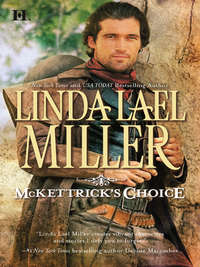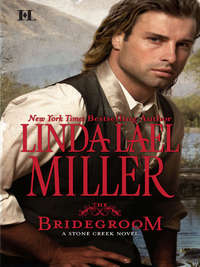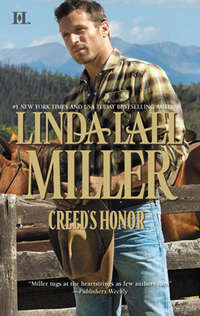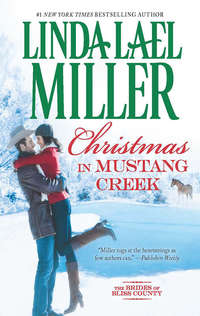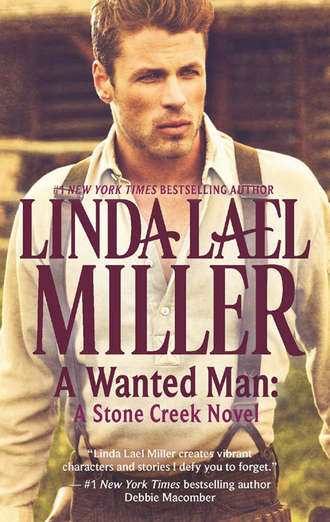
Полная версия
A Wanted Man: A Stone Creek Novel
Rowdy leaned and added more wood to the fire. “I’ve done some things in my life that I wish I hadn’t,” he said.
Lark sighed. Why did he have to be so darn likable? She’d been a lot more comfortable around Rowdy Rhodes before he’d warmed her feet with his hands. “So have I,” she heard herself say.
They sat for a long time in a companionable, if slightly uncomfortable, silence.
“Maybe I’ll go someplace warm when I leave here,” Rowdy said presently.
So he was just passing through, as she’d suspected. And devoutly hoped.
Why, then, did the news fill her with sudden, poignant sorrow?
“Mrs. Porter will certainly be disappointed when you leave,” Lark said.
“But you’ll be relieved, won’t you, Lark?”
“Yes,” she replied quickly but without enough conviction.
Rowdy smiled to himself. “Why don’t you tell me what—or who—you’re so afraid of? Maybe I could help.”
“Why should you?”
“Because I’m the marshal, for one thing. And because I’m a human being, for another.”
Lark swallowed. “I don’t trust you,” she said.
“Well,” Rowdy sighed, taking up the poker, opening the stove door and stirring the fire inside, “that much is true, anyway.”
“Are you calling me a liar?”
“In a word, yes.”
Lark felt an inexplicable need to convince him. “I did grow up in St. Louis, in my grandfather’s home. I went to boarding school, too.”
“And you lived in Denver. Beyond those things, though, you’ve been lying through your pretty teeth.”
Lark was indignant, and she forcibly suppressed the little thrill that rose inside her at the compliment couched in his accusation, as she had the delicious, strangely urgent languor she’d felt when he touched her feet. “I cannot think why you’re interested in my personal affairs,” she said, as haughtily as she could.
“You’d have been better off not to be so secretive,” Rowdy observed. “When somebody presents a puzzle, I have to figure it out. It’s part of my nature, I guess.”
“Maybe you’re just nosy.”
He laughed, low and soft. Something quivered in resonance, low in Lark’s belly, like a piano string vibrating because the one next to it had been struck. “Maybe I am,” he agreed. “Nevertheless, there will come a day—or perhaps a night—when I know everything there is to know about you, Lark Morgan, and a few things you don’t even know about yourself.”
The implication, though subtle, was unmistakable. Lark was suddenly too warm, and would have thrown off the blanket if it hadn’t meant sitting in close proximity to Rowdy in a gossamer nightgown and a woefully inadequate matching wrapper.
An achy heat suffused her as she imagined herself—the images flooded her mind and body, quite against her will—naked beneath Rowdy Rhodes’s strong, agile frame.
Worse, he knew what she was thinking. She could tell by the look in his eyes and the amused way he quirked up one side of his mouth, not quite but almost grinning.
“You are the most audacious man I have ever encountered,” she said.
“I’m a few other things you’ve never encountered, too,” he drawled.
She stood up, swayed, flinched when Rowdy steadied her with one hand.
“Sit down,” he said, “before you trip over that blanket and take a header into the stove.”
“I don’t have to listen to—”
He tugged on the blanket, and she landed, not in her own chair, but square on his lap. For a moment she was too stunned to struggle. She simply stared at him.
“Just let me hold you,” he said.
If he’d made a move to kiss her, or touched her in any inappropriate place, she’d have had some way of defending herself. As it was, he simply wrapped his arms loosely around her and pressed her head to his shoulder with one gentle hand.
She was helpless against him.
He propped his chin on top of her head. “There, now,” he said soothingly.
Lark closed her eyes, bit her lower lip and fought back tears. Other men had held her, particularly Autry, but never in that undemanding way. No, never once in all her twenty-seven years.
Perhaps Rowdy knew that had he risen to his feet, carried her to his bed and made love to her, she wouldn’t have resisted him. Perhaps he didn’t.
Lark finally stopped shivering, relaxed against his hard chest, cosseted inside the blanket, and promptly fell asleep.
* * *
HE WOKE HER AT DAWN, figuring Mai Lee would be up and around soon, or Mrs. Porter.
It wouldn’t do for either of them to come upon such a scene.
Lark yawned and stretched, wreaking havoc with Rowdy’s senses—he hadn’t so much as closed his eyes since she’d landed on his lap, all soft and warm and woman scented.
He’d felt acquiescence in her, and been sorely tempted to bed her.
He knew she’d be responsive, give herself up to him with shy fervor. He knew precisely where to touch her, where to kiss her, how to set her ablaze with need.
He’d been a fool not to, and he’d suffered for his restraint.
She’d surely been with a man before.
And yet there was that troublesome, contradictory innocence about her.
With an inward sigh, he set her on her feet, held her firmly by the waist until, blinking and sleepy, she found her balance.
“Go,” he said hoarsely. “They’ll be awake soon, Mrs. Porter and the others.”
Lark bit her lower lip, hesitated, then hiked up the blanket and hot-footed it for the back stairs.
Rowdy stood up, groaned. He was hard as tamarack, and it would be a while before the raw wanting slackened.
Pardner got to his feet, went to the door and whimpered to be let out.
Rowdy didn’t bother to put on his coat and hat. He just worked the latch and opened the door, welcoming a rush of wind so cold that it made his eyes water.
Yes, sir.
A little fresh air was just what he needed.
* * *
UPSTAIRS, IN THE SAFETY of her room, Lark washed hastily and donned her primmest dress, the modest, high-collared black wool she’d been wearing when she’d fled Denver during a funeral. She’d feigned a headache, knowing Autry wouldn’t flaut convention by leaving the huge, stuffy church before the service was over, and asked his carriage driver to take her home.
Once there, she’d packed in a desperate rush and prevailed upon that same driver to deliver her to the railroad depot, claiming she’d just gotten word, by telegram, that her sister had taken gravely ill.
She’d been anxious all the way to the station. She knew the train schedules by heart, and if she missed the two-o’clock, she’d never escape. Moreover, Autry would realize she’d deceived him, and the consequences of that didn’t bear considering.
The carriage driver, the oldest retainer on Autry’s large household staff, might have been suspicious, but he hadn’t questioned her orders. He’d simply taken the most direct route to the depot, unloaded her belongings onto a porter’s cart, tipped his hat to her, and wished her Godspeed.
Now, standing in a boardinghouse room, trembling with cold and the fear stirred up by remembering, Lark considered filling a single reticule and running away again.
There wouldn’t be a stagecoach through town until Thursday morning, and she didn’t have the fare, but perhaps she could prevail upon someone, a freight driver or a peddler, for instance, to give her a ride to—where?
Flagstaff?
She sat down heavily on the edge of her bed. What would she do when she got to Flagstaff?
Perhaps she could pawn her cameo brooch there and buy passage on a train—
No, not a train.
Autry might have agents aboard, because of the recent robberies, to protect his financial interests. And any one of them might recognize her as the upstart wife who’d dared to fly the coop and add insult to injury by having divorce papers served upon her outraged husband only ten days after her departure.
Tears filled Lark’s eyes. She pinned the cherished cameo brooch, her mother’s most precious treasure, to the bodice of her dress. How could she part with it?
Besides, she didn’t want to run. She loved her pupils, loved seeing the light of understanding in their eyes when they suddenly grasped some new concept or idea, mastered some elusive skill. She loved Stone Creek, damnably cold though it was in winter and, anyway, she’d been invited to the O’Ballivans’ home for supper on Friday night.
She bit down hard on her lower lip. She’d behaved like a hussy, down there in the kitchen. Sat in Rowdy’s lap, like some...dancehall girl. And, dear God, at the slightest encouragement from him, she’d have gone willingly, even eagerly, to his bed.
He’d been so tender.
He’d been so strong.
And he’d as much as said, outright, that he’d have her.
Nevertheless, there will come a day—or perhaps a night—when I know everything there is to know about you, Lark Morgan, and a few things you don’t even know about yourself.
She blushed at the memory of his words and the way he’d said them.
He meant to seduce her, sooner or later, and he’d taken the first step in the process the night before, in Mrs. Porter’s kitchen.
What would be next?
A kiss? A caress?
Rowdy Rhodes was a patient man, that much was obvious. One by one, he would strip away her defenses, like garments.
If she stayed in Stone Creek, her downfall was inevitable.
She’d barely resisted him the night before, barely kept herself from lifting her head from his shoulder, finding his mouth with her own, kissing him, like some brazen trollop, some tramp—
Some saloon singer.
Lark gave an involuntary whimper.
Even now, at what should have been a safe distance, with Mrs. Porter and Mai Lee up and about, she wanted him.
Wanted his hands on her breasts, her hips, her thighs.
“Stop it!” she said aloud, squeezing her eyes shut.
After several minutes of deep, slow breathing, Lark regained some semblance of self-control.
A light rap sounded at her door. “Mai Lee has breakfast ready, dear,” Mrs. Porter called cheerfully. “And if you don’t hurry, you’ll be late for school.”
“Coming,” Lark called back, with an effort at equal good cheer. But her voice quavered a little.
The creaking of the front gate sent her scurrying to her window. She tugged aside the curtain and looked out.
Rowdy was just stepping onto the sidewalk, Pardner cavorting at his side.
She let out a long breath. At least she wouldn’t have to sit across the table from him, choking down her breakfast, pretending she hadn’t let him rub her feet the night before, hadn’t sat in his lap and felt so foolishly safe that she’d fallen asleep.
She watched from the window until she was sure Rowdy wouldn’t double back, then hurried downstairs with as much dignity as she could manage. Their two chairs, she was glad to see, were back in their usual places at the table, and there was no indication that either of them had been in the kitchen at all during the wee, scandalous hours of the morning.
Except for the two coffeecups sitting beside the sink.
Mai Lee looked at them curiously, then glanced at Lark, frowning a little.
Thankfully, Mrs. Porter didn’t seem to notice the stray cups. She took Lark’s cloak from the peg by the door, carried it over to the stove and draped it over a wooden rack alongside, so it would be warm when she wore it to the schoolhouse.
Lark’s eyes burned again.
“Rowdy suggested it,” Mrs. Porter explained brightly, smiling at Lark. “He said you’re uncommonly sensitive to the cold. He even said you might want to move into his room—once he’s gone to live in the new place, of course.” Here, she paused to blush girlishly. “I don’t know why I didn’t think of that before. There’s no reason you couldn’t use the best quarters when they’re not rented.”
Lark straightened her spine. “Th-thank you,” she said.
“No reason at all,” Mrs. Porter prattled on, still caught up in her musings. Then, with a pointed glance at the clock, she added, “Hurry up, now. You’ll have to gobble your food and practically run to the schoolhouse as it is, if you’re going to ring the bell at eight o’clock.”
Lark nodded gratefully. She consumed a fried egg and a slice of toasted bread and drank her coffee so quickly that she burned her tongue. Mai Lee had packed her lunch in a lard tin, as she did every weekday morning, and set it on the counter nearest the back door. Mrs. Porter had made special arrangements with the school board, soon after Lark’s arrival in Stone Creek, when she realized her boarder was going without food between breakfast and the evening meal.
“I’ll be having supper with Maddie and Sam O’Ballivan this Friday night,” Lark said, out of courtesy and because she was a little proud of the invitation.
Mrs. Porter went still.
So did Mai Lee.
“Is something wrong?” Lark asked, carrying her plate and silverware to the sink, setting them on the drain board next to the cups she and Rowdy had used earlier. She was putting on her cloak before either of them answered.
“It’s just that nobody’s been invited out there since Sam brought Maddie home as his bride,” Mrs. Porter said, trying to smile but not quite succeeding.
“I’m sure they mean to entertain more once they’ve settled in,” Lark was quick to offer.
“It’s been over a year since Maddie came,” Mrs. Porter said uncertainly.
Lark assumed a confidential tone. “Terran and Ben tried to skip school yesterday,” she said, as though imparting a secret that must be guarded at all costs. “Maddie probably wants to speak to me about—disciplinary measures.”
Mrs. Porter brightened immediately. “I’m sure that’s it,” she said.
“Of course it is,” Lark replied briskly, grabbing up her lunch pail and reaching for the doorknob. “Naturally, I’d like you to keep this in strictest confidence.”
“Naturally,” Mrs. Porter said eagerly.
By the time school let out for the day, Lark figured, the news would probably be all over town.
* * *
ROWDY STOPPED OFF at the mercantile to order supplies, like coffee and sugar, and then picked up the pinto, who’d come with the name Paint, and installed him in the barn behind the marshal’s house. A supply of hay had already been laid in; probably Sam and the major’s doing.
Polishing his badge with the sleeve of his trail coat, Rowdy surveyed the yard, enclosed by chicken-wire fencing, and the land beyond it. There was a house back there, if it could be called that, since it leaned to one side and probably didn’t measure more than eight-by-eight. A cardboard sign, crudely lettered and attached to the door frame, proclaimed the place was for sale, with some scribbling underneath.
Rowdy decided to investigate, and Pardner went along, like he always did. If Rowdy’d gone through the gates of hell itself, he figured the dog probably would have followed.
The inside of that shack looked even worse than the outside. The stone fireplace was crumbling, and half the floorboards were missing. Those that remained were probably rotten.
He paused on the threshold, stopped Pardner with a movement of his knee when he would have ventured inside.
Rowdy stepped back, walked around the perimeter of the place, noted the overgrown vegetable garden, the teetering privy and the well. Returning to examine the cardboard For Sale sign, he noted from a scribbled addition that the whole place, a little under an acre, could be had for fifty dollars in back taxes.
He rubbed his chin, thinking about becoming a landowner.
He’d saved most of his pay while he was in Haven, so he was flush, and he’d developed a penchant for carpentry, helping to rebuild the burned-out town. He liked the smell of freshly planed lumber and the release of swinging a hammer or wielding a saw.
It was a fool’s notion, of course.
What could he do with an acre of ground?
And, anyhow, he planned to move on, once he’d gotten the truth of the train-robbing situation and unraveled the secrets behind Lark Morgan’s brown eyes.
Still, with the railroad headed in that direction, the land might make a good investment. He’d need something to fill his free time, since Stone Creek didn’t appear to be a hotbed of crime or social activity, and putting that shack to rights seemed like a sensible occupation.
Resolved, he went back to the jailhouse and built a fire in the potbelly stove. By the time he’d adjusted the damper and shifted the chimney pipe to close the gaps issuing little scallops of dusty smoke, the supplies had arrived from the general store.
He put a pot of coffee on to brew.
Pardner, meanwhile, padded into the single jail cell, jumped up on the cot inside and settled himself for a snooze.
Jolene Bell showed up before the coffee was through perking.
“I hope you’ll be a better lawman than old Pete Quincy was,” she said.
“I guess that remains to be seen,” Rowdy replied. He’d have offered her some of the coffee, but it was still raw and he only had one cup.
“I run a clean place,” Jolene told him, after working up her mettle for a few seconds. “My girls are all of legal age, and my whiskey ain’t watered down, neither.”
Rowdy bit the inside of his lip, so he wouldn’t grin. Obviously, Jolene was there on serious business. He’d learned a long time ago that if a woman had something to say, it was best to listen, whether she was the preacher’s wife or the local madam.
“Am I gonna have trouble with you?” she asked, frowning.
Rowdy hooked his thumbs in his gun belt. “Not unless any of your ‘girls’ are there against their will,” he said. “And I’ll be by to collect pistols, if I see more than a dozen horses tied up at your hitching rail.”
Jolene’s gaze slipped to the .44 on his left hip. “Might be some as protest a rule like that one,” she asserted.
“I don’t give a damn whether they protest or not,” Rowdy replied.
“Since when is there a law on the books that says cowboys got to surrender their sidearms afore they can do any drinkin’?”
“Since now,” Rowdy said. “They’ll get the guns back when they’re ready to ride out, sober.”
“I’d be interested to see how you plan to make that stick,” Jolene told him. “There’s a lot of big spreads around here. The cowboys work long, hard hours, and when they get paid, they like to come into town and have themselves a good time. They get pretty lively, sometimes—especially if there’s a dance down at the Cattleman’s Meeting Hall, like there is next Saturday night.”
“All the more reason,” Rowdy said, “to enforce the Rhodes Ordinance.”
“The Rhodes Ordinance? I ain’t never heard of it.” Her tiny eyes widened as revelation struck. “Say—that’s your name, ain’t it? Rhodes?”
“Yep,” Rowdy said.
“You can’t just go around makin’ laws and expectin’ the rest of us to abide by ’em,” Jolene protested, drawing herself up in righteous indignation.
“I imagine the town council will support it,” Rowdy replied.
“If that don’t beat all,” Jolene marveled. “Ol’ Quincy was a piece of work—I had to pay him fifty cents a week just to stay clear of my place—but I figure you just might be worse.”
Rowdy smiled. “I won’t be staying clear of your place,” he said. “I might even sit in on a hand of poker now and then.”
Jolene narrowed her eyes. “You gonna put any kind of nick in my pocketbook, Mr. Rowdy Rhodes-Ordinance?”
“Nope,” Rowdy said.
A slow grin spread across Jolene’s pockmarked, sallow face. “Well, now,” she said. “Looks like we’re all in for a time of it.”
“Looks that way,” Rowdy agreed affably. He cocked a thumb over his right shoulder. “Who do I talk to about buying the place on the other side of the back fence?”
Jolene told him, and half an hour later, he was a man of property.
5
PA’D SADDLED UP and gone off someplace, in the middle of the night. Bent over a book at his desk in the back of the big schoolroom, Gideon couldn’t take in the words he was supposed to be reading. He just kept remembering.
He’d awakened out of a sound sleep, hearing noises he thought were coming from the shed out behind the saloon, gotten up out of his bed, pulled on his clothes and boots, and headed out there to investigate.
And there was Pa, dressed to ride a distance, fastening his rifle scabbard to the saddle. His gelding, Samson, snorted and tossed his big head, eager to be away.
“You go on back inside, Gideon,” Pa’d said. He wore his round-brimmed hat, and there was a bandana tied loosely around his neck. Under his long coat, he wore a gun belt, with a holster on either side. The pearl handle of one of his .45s flashed in the gloom as he swung up onto the horse.
“Let me go along, Pa,” Gideon had said, at the edge of pleading. “I can get a horse over at the livery stable—”
“You stay here and look after Ruby,” Pa replied. He’d clamped an unlit cheroot between his strong, white teeth, and he shifted it from one side of his mouth to the other, looking as though he might ride Gideon down if he didn’t get out of the way.
If there’d ever been a woman who didn’t need looking after, it was Ruby Hollister. She kept a loaded shotgun behind the bar, and everybody in Flagstaff knew she wouldn’t hesitate to use it. No, sir. She would not be requiring Gideon’s protection.
“At least tell me where you’re off to, Pa,” Gideon had argued.
“That’s none of your never-mind,” Pa had answered, narrowing his chilly blue eyes with impatience. “Now, step aside.”
Gideon stood his ground for a long moment, but in the end, he couldn’t prevail against his pa’s hard stare. “When’ll you be back?” he’d asked.
Pa hadn’t said anything in response. He’d just nudged the gelding into motion with the heels of his boots—not the fancy ones he usually wore, Gideon noticed, but the light, supple kind, made for moving fast, but soled for hard going.
Gideon had moved out of the shed doorway, lest he be trampled, and Pa had bent low over the saddle to avoid knocking his head as he passed through.
He’d vanished into the darkness, the hooves of his horse beating on the hard dirt, the sound growing fainter as he gained the road.
When the cold of that winter night finally penetrated Gideon’s awareness, he’d gone inside. Shed his boots and lain down on top of his bed in his clothes, staring up at the ceiling, knowing he wasn’t going to sleep.
At breakfast, Ruby had been pale and unusually fidgety.
Gideon had been bursting with questions, but he hadn’t dared put a one of them to her. When Ruby didn’t want to talk, the devil and ten red-hot pitchforks couldn’t make her do it.
Now, sitting in the schoolroom, he felt restless, as though there were something else he ought to be doing, and wasn’t.
He thought about Rowdy, the brother he barely knew.
You ever need any help, you’ll find me boarding at Mrs. Porter’s, over in Stone Creek.
A hand came to rest on Gideon’s shoulder just as he was recalling that conversation for the hundredth time, nearly scaring him right out of his hide. He wasn’t commonly the jumpy sort, and it embarrassed him mightily, the way he’d started. He felt his neck and face go warm.
“You’re not concentrating, Gideon,” Miss Langston said good-naturedly, smiling down at him. She was about a thousand years old, short and square of build, a phenomenon that had confounded him until Ruby had explained the mysteries of a lady’s corset. “It’s too early for spring fever, but I’ll vow, you’re already afflicted.”
Gideon tried to smile, because he liked Miss Langston. She was briskly cordial, and never made sly remarks about Ruby or his pa, like a lot of folks did. And she’d attended Rose’s funeral, too, he remembered. Cried into a starched hanky with lace trim around the edges.
“I’ve got some trouble at home,” he confided, keeping his voice down so he wouldn’t have to fight later, out in the schoolyard. He’d never lost a one of those battles, but, as his pa liked to say, there was no shortage of idiots in the world. There was always somebody ready to take him on.


